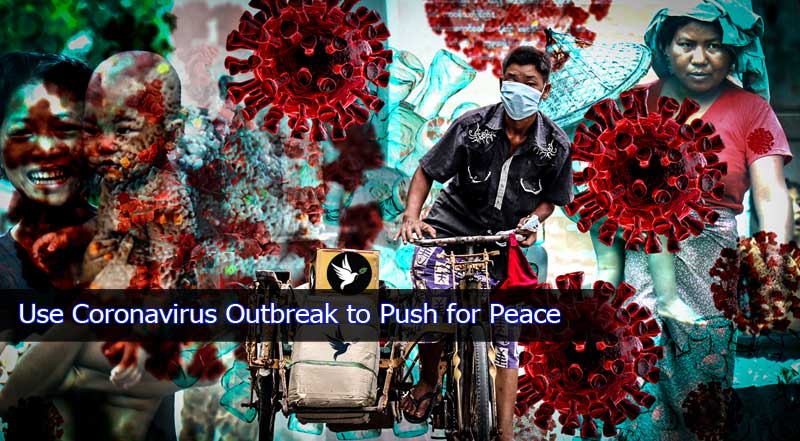- 15 mass casualty incidents from regime airstrikes reported in Arakan State since 2023
- Kyaukphyu IDPs forced to flee again amid junta airstrikes and artillery attacks
- New Diplomatic Movements Between Bangladesh’s New Government and the Arakan Public Administration
- Junta claims over 24 million ballots cast in 2025 poll, cites strong youth turnout
- ULA expands HIV prevention, healthcare services for sex workers in AA-held areas
Use Coronavirus Outbreak to Push for Peace
Under the current government, Myanmar’s peace process has faced multiple delays. Meanwhile the government has made not a single remark on the situation of human rights breaches in Arakan State, including the deaths of civilians while in Tatmadaw custody.
31 Aug 2020

By Min Htee | DMG
An outbreak of COVID-19 began in August in Sittwe, the capital of Arakan State, which is the poorest and most conflict-scarred part of Myanmar — which is itself one of the poorest countries in Southeast Asia.
Originating in China, the coronavirus pandemic has threatened countries rich and powerful, poor and peripheral alike. Even the superpower United States of America faces difficulties.
The number of COVID-19 cases in the recent outbreak is so far highest in Sittwe, while about 200,000 people are displaced from their homes in Arakan State. They have taken shelter at displacement camps or other temporary accommodations, such as local monasteries, where complaints say they are not being provided sufficient relief aid from the government.
The virus and the vulnerable
The outbreak is a difficult situation to deal with, especially for people facing the pandemic amid poverty.
A week after the first case of local transmission in Arakan State was reported on August 16, commodity flows from other parts of Myanmar and transportation between most Arakan State townships and the state capital Sittwe were badly disrupted.
It has been about eight months since the pandemic began, but even the world’s most medically, scientifically and technologically advanced nations have yet to create a vaccine or therapeutics to treat the disease. More than 800,000 people across the globe have died from COVID-19.
The upsurge in coronavirus cases in Myanmar’s Arakan State began on August 16, three days before the fourth session of the Union Peace Conference was due to convene. The number of cases had risen to 361 by August 31.
Seven Arakan State townships and Chin State’s Paletwa Township have faced internet restrictions since June 2019, with an outright ban on mobile internet access lifted before the Union Peace Conference. But the 2G network that has been provided to about 1 million residents in the affected townships is still a far cry from the access to information that many have demanded.
At a time when information is power more than ever, and has the potential to be life-saving, too many people in Arakan State are in the dark when it comes to COVID-19, from preventive strategies to the pandemic’s latest developments.
COVID-19 and peace prospects
The fourth session of the Union Peace Conference was held in Nay Pyi Taw over three days, beginning on August 19, but the government did not invite the Arakan Army, which has been declared a terrorist group. But locals contend that it is the Tatmadaw that has been doing most of the terrorising in Arakan State; the day after the UPC concluded, five people from Kyaukyan Thazi village in Rathedaung Township were injured when the military launched artillery shells into the village.
The Tatmadaw declared a ceasefire during the pandemic, but Arakan State has not benefited from the unilateral declaration because the “terrorist group” AA is active in the state. There has been no appreciable decline in hostilities in Arakan State since the ceasefire was promulgated in May.
Under the current government, Myanmar’s peace process has faced multiple delays. Meanwhile the government has made not a single remark on the situation of human rights breaches in Arakan State, including the deaths of civilians while in Tatmadaw custody.
Remarks uploaded to State Counsellor Daw Aung San Suu Kyi’s Facebook page after the first cases of the current outbreak were reported last month attracted significant public criticism on social media networks among Arakanese people, who said her words and tone amounted to victim-blaming of COVID-19 patients.
We must consider whether it was because of the collapse of trust between the State Counsellor and Arakanese people, which can be traced back to the 2015 election. It was then that the Arakan National Party won a majority of votes in Arakan State but saw its subsequent demand to form the Arakan State government ignored by Daw Aung San Suu Kyi’s National League for Democracy government.
Regardless, it is necessary that we fight together against the common enemy of all people globally, COVID-19. The government needs to stop its war in Arakan State.
The loss of lives is the country’s loss too. The government should use the pandemic as an opportunity to promote peace ahead of the general election in November, when democracy demands that voting be held across as much of Arakan State as possible despite the challenges posed by COVID-19 and the conflict dynamics at play.
As the State Counsellor said during her opening speech at last month’s UPC’s fourth session, it is time “to tightly hold the emerging opportunities” of the peace process.
For both the military and the Arakan Army, that means building mutual trust while fighting the main enemy, COVID-19, together. It is this deadly virus that ultimately represents the greatest threat to the long-term interests of the people.








.jpg)











